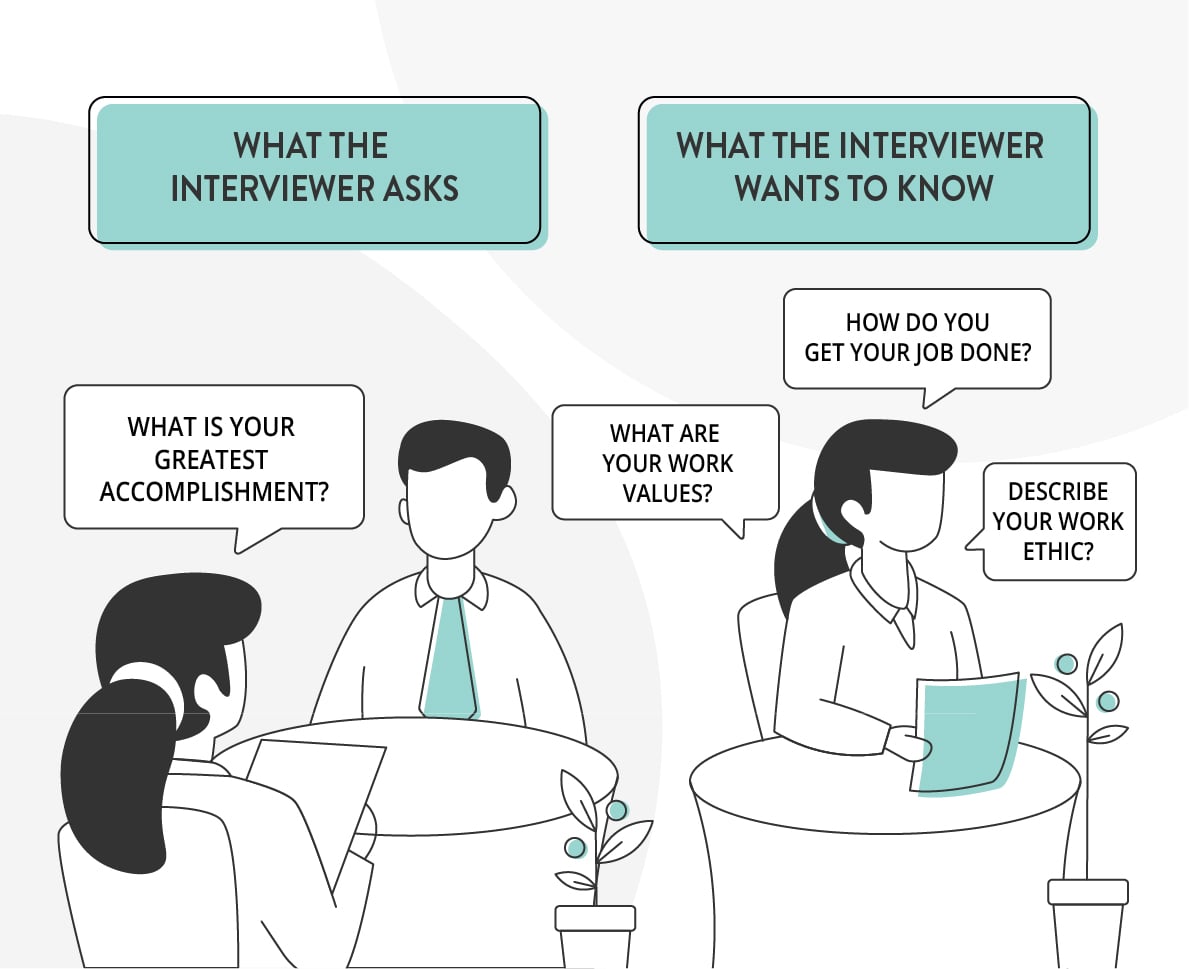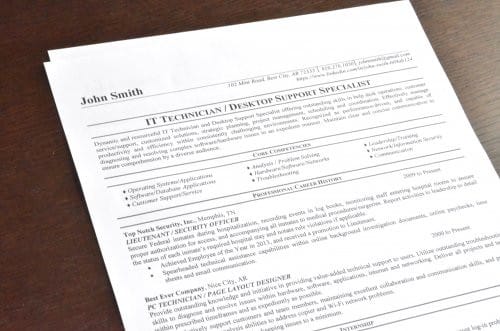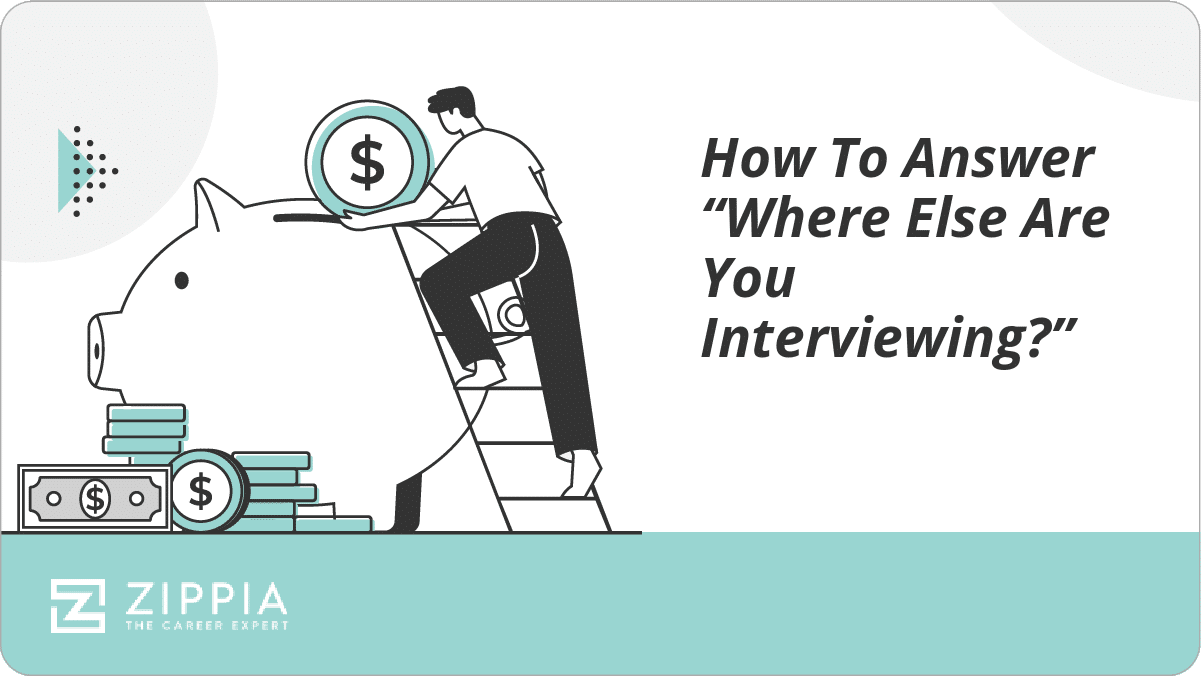- Common Questions
- Interview Questions
- How To Answer Tell Me About Yourself?
- Elevator Pitch
- Where Do You See Yourself In 5 Years?
- What Are Your Career Goals?
- When Can You Start?
- How Do You Define Success?
- Describe Your Work Ethic
- Where Are Your Current Duties?
- What Are Your Learning Goals?
- Intrinsic Vs Extrinsic Motivation
- What Is Your Desired Salary?
- What Makes You Unique?
- Why Are You The Best Person For This Job?
- Reasons For Termination
- What Are Your Work Values
- How To Make A Hard Decision?
- What Are You Most Proud Of?
- Personal Code Of Ethics
- Problem Solving Interview Questions
- Taking Initiative Example
- How Do You Prioritize Your Work
- Explain Gaps In Employment
- Most Rewarding College Experience
- What Is Your Work Style
- Tell Me About A Time When You Made A Mistake On The Job
- Tell Me About Gaps In Employment
- What Are You Passionate About
- What Skills Would You Bring To The Job
- Who Is Your Mentor?
- Tell Me About Gaps In Employment
- How To Answer Tell Me About A Time You Disagreed With Your Boss
- How To Answer Common Screening Questions
- How Do You Handle Stress
- Are You Willing To Travel?
- Do You Work Well With Others?
- Why Do You Want To Work Here?
- What Is Your Greatest Weakness?
- Where Else Are You Interviewing?
- Tell Me About A Time You Failed
- How Do You Like To Be Managed?
- Do You Have Any Questions For Me?
- What Gets You Up In The Morning?
- What Do You Know About Our Company?
- What Is Your Greatest Strength?
- What Is Your Dream Job?
- What Is Your Ideal Work Environment?
- Why Are You Looking For A New Job?
- Why Should We Hire You?
- What Motivates You?
- What Else Should We Know About You?
- When Have You Made A Split Second Decision?
- Tell Me About A Challenge You've Faced At Work
- What Sets You Apart From Other Candidates?
- What Is Your Greatest Accomplishment?
- Types Of Questions
- Situational Interview Questions
- Promotion Interview Questions
- Internal Interview Questions
- Open Ended Interview Questions
- Tough Interview Questions
- Leadership Interview Questions
- Teamwork Interview Questions
- Interview Questions About Communication
- Personality Interview Questions
- Internship Interview Questions
- Ice Breaker Questions
- Recruiter Interview Questions
- Brain Teaser Interview Questions
- Group Interview Questions
- Competency Based Interview Question
- Grad School Interview Questions
- Scrum Interview Questions
- Excel Interview Questions
- Common Phone Interview Questions And Answers
- Job Specific Questions
- Why Did You Choose Nursing?
- Why Do You Want To Be A Teacher?
- Why Do You Want To Be A Doctor?
- Why Do You Want To Be A Police Officer?
- Police Officer Interview Questions
- Why Do You Want To Be An Accountant?
- Sales Interview Questions
- Interview Questions For Managers
- Retail Interview Questions
- Teacher Interview Questions
- Accounting Interview Questions
- Teaching Philosophy Examples
- Management Philosophy Examples
- Leadership Philosophy
- What Does Customer Service Mean To You
Find a Job You Really Want In
- Why Interviewers Ask “What Is Your Greatest Accomplishment?”
- How to Answer “What Is Your Greatest Accomplishment?”
- Example Answers to “What’s Your Greatest Accomplishment?”
- Tips for Answering “What Is Your Greatest Accomplishment?”
- How to Choose Just One Example for Your Greatest Accomplishment
- Final Thoughts
- Sign Up For More Advice and Jobs
“What is your greatest accomplishment?” is one of the most common job interview questions, but — particularly for someone fresh out of college or high school — it can be daunting to answer.
We’ll cover why interviewers ask about your greatest accomplishment, provide tips for giving the best answer, and tie it all together with a few sample answers.
Key Takeaways:
-
When answering this question you want to make sure you prepare your answer, read the job description, and use the star method in your answer.
-
It’s known as a behavioral interview question, which means the hiring manager is looking for an example of your past behavior that will indicate success in the future.
-
Talking about your own achievements can be pretty uncomfortable for some — we’re taught not to brag from an early age. But at a job interview, your job is to be anything but humble.

Why Interviewers Ask “What Is Your Greatest Accomplishment?”

Like with all good interview questions, when an interviewer asks you about your “greatest accomplishment,” they’re not just taking that answer at face value. They’re hoping to gain some sort of insight about you from the way you choose to answer the question.
It’s not a trick question, per se, but it is one that you want to be intentional about the way that you answer.
When a recruiter or hiring manager asks you about your greatest accomplishment, they really want to know three main things:
-
Your work ethic. How hard do you routinely work? How much work does it take for you to feel as though you’ve contributed to a work accomplishment?
-
Your values. What do you view as being an accomplishment? How much work are you willing to put in to accomplish something at work? Are accomplishments in general out of the ordinary for you?
-
Concrete examples of your work. Recruiters and hiring managers don’t just want to hear that you know how to work — they want specifics. This gives them some insight into big projects you might have undertaken in the past, and it gives them a basis for their expectations of your work in the future.
Your interviewers will assess how well your work style and values fit with the company culture. Your hard skills might be on display while you answer this question, and your soft skills certainly will be.
It’s the inverted version of “tell me about a time you failed,” but they’re both behavioral interview questions, meaning you’ll need good stories to tell the hiring manager for each.
How to Answer “What Is Your Greatest Accomplishment?”
So now that you know what an employer is looking for with this question, how do you go about answering it in a way that makes you look like a good candidate?
-
Preparing an answer. Make a list of all your professional accomplishments. Don’t hold back here — include even small achievements.
The more examples you have to pull from, the better you’ll be able to tailor your stories for multiple interviews. Not to mention that your other accomplishments may come up when you’re answering a different interview question.
-
Read the job description closely. Look for keywords and the primary responsibilities of the position. That way, you can choose an accomplishment that best aligns with the duties of the new job.
For example, if there’s a big focus on customer service in the role you’re interviewing for, you might select a story that showcases your people skills over your technical abilities.
-
Use the STAR method. This question is a behavioral interview question. As with all behavioral interview questions, use the star method:
-
Situation. It won’t matter how good your story is if they don’t understand the context. Set your story up with a brief description of the situation that led to your accomplishment. Is this the kind of work you typically do? If so, why mention this example specifically? And if not, what made it an outlier?
-
Task. What was your role in the situation? This can often be tied together with the situation in one or two sentences.
-
Action. What did you do? This is the meat and potatoes of your answer — make sure you can tell the interviewer all of the important parts without getting over-the-top detailed.
-
Result. What was the outcome of your action? Obviously, the result should be monumentally positive for this answer, since we’re talking about your greatest accomplishment. If you can, quantify the results in a way that speaks to the value you’d bring to the job you’re applying for.
-
Example Answers to “What’s Your Greatest Accomplishment?”
We’ll get you started with a brief template to give you an idea of how to organize your answer:
“My team achieved our goal of [goal your team was working toward]. My part of the project was [your duties]. While this project wasn’t revolutionary, I’m proud of it because I learned [skill or concept you learned that relates to the job]. Because of this experience, next time I run into this challenge, I’ll be able to use my newfound abilities with [skill or concept].”
And now a few full sample answers to tie all our advice together:
-
Example 1: Human Resources Manager
My greatest accomplishment happened at my last role as an HR manager. I was assigned the task of reworking how we onboarded remote hires, since it was taking a long time to bring them up to speed. The materials we had for training weren’t very relevant or helpful for their duties, and we had received only 19% positive reviews from new hires who completed the training.
I researched the best remote training methods and implemented them into a new system using XYZ software. By using feedback from the evaluation forms and best industry practices, I was able to develop a new onboarding system from the ground up. When I left that role, 97% of new hires gave positive reviews for the training program.
This helped retain new remote workers and decreased the the time it took to get them up to speed, saving the company an average of $2,650 per remote employee.
-
Example 2: Teacher
At my current job as a fifth-grade teacher, my greatest accomplishments always involve watching my students achieve something. Last year, I had a student who was struggling with dyslexia. While he had a tough time reading the words, I knew that he loved drawing and fantasy movies like Lord of the Rings.
We got together during his break period once a week to read Lord of the Rings and make drawings for each chapter. He then went home and continued reading. His parents called to tell me that they had never seen him excited to do homework before, especially when it involved reading.
By the end of the year, his reading scores had gone up by over 15%, but the real accomplishment for me was getting him interested in learning something that had previously frustrated him.
-
Example 3: Sales Representative
My greatest accomplishment happened last quarter, when my team was behind on our sales quota. We were having trouble selling our new product, despite our best marketing efforts.
I came up with a new marketing strategy involving social media campaigns that increased our sales by 155%. Not only that, but it had a knock-on effect of increasing user engagement with our social media platforms by 70% in just a month.
It blew my expectations out of the water, and my company went on to assign me more marketing tasks in the future. We’ve also continued to use the same strategy for new products, which has cut down the time it takes them to reach customers significantly.
Tips for Answering “What Is Your Greatest Accomplishment?”
In a nutshell, you want to stick to a single example if you can — unless they ask you for more — and you want to make sure that this example represents the best work you’ve done in the past while simultaneously being an interesting story.
Sounds easy, right?
When talking about your greatest accomplishment, keep the following things in mind:
-
Mention how good the accomplishment was for you, but focus on the value added to your employer. Obviously the most important thing about the accomplishment to you was the way that it affected your own life, but an interviewer is going to be wondering how you’re going to benefit them and their own company in the future.
-
Don’t go negative. There are other interview questions about conflict and challenges, but your answer for this question should be overwhelmingly positive. Don’t make anyone else look bad in your story; just talk about a time you were really proud of something impressive you did.
-
Display specific qualifications. If you can stand out with an answer that ties your qualifications and skills directly to the job description, you can get a lot done with this answer.
-
Make sure you prepare for this question ahead of time. You don’t want to be scrambling to remember a story at the last second. You’ll leave out details, or worse, forget your best stories.
-
Don’t lie. Job seekers are often haunted by lies, so it’s best to avoid them altogether. If you need to simplify your story for simplicity and the sake of keeping it brief, that’s fine – as long as the essential terms of your accomplishment are accurate.
How to Choose Just One Example for Your Greatest Accomplishment
Sometimes, the hardest problem you’ll face in answering this question won’t be coming up with a single answer: It’ll be choosing between several different ones.
After all, odds are pretty good that if you’ve worked long enough to have one big accomplishment, it’s not the only accomplishment that you’ve had. Chances are you’ll have several good stories to choose from, and they might all be comparable in terms of their impressiveness.
If you’re having trouble choosing just one example for your greatest accomplishment, keep the following things in mind:
-
Stick to work examples. The fact that you ran a marathon after eating an entire box of Krispy Kreme doughnuts is impressive, but maybe not pertinent to how good of an engineer you are.
-
Choose something recent, if you can. It’s always better to have a recent story versus one from ten years ago, especially if the skills you display are no longer relevant to the modern work you’ll be doing.
-
Don’t lie or embellish too much, but think about which of your examples makes the best story. That is to say, don’t make a story where there isn’t one. But you want to talk about something that’s not just impressive to you — you want it to be impressive to anyone. That means picking your accomplishment based on how good of a story it’s going to make.
Final Thoughts
That’s all for this one! Just keep in mind: No matter how few jobs you’ve had before the one you’re interviewing for, you should always have an answer to this question.
Regardless of how true it is, “I don’t really have any greatest accomplishments” is just bad optics all around. So if you feel like you don’t have any good answers to this question because you haven’t been working long enough, you’re going to have to get a little creative.
Think about school projects, trips, private tragedies, public disasters — anything that required you to work to overcome something while contributing to something or someone else around you.
There are times when having no answer is still an appropriate response to a question you’re asked. This is not one of those times.
- Common Questions
- Interview Questions
- How To Answer Tell Me About Yourself?
- Elevator Pitch
- Where Do You See Yourself In 5 Years?
- What Are Your Career Goals?
- When Can You Start?
- How Do You Define Success?
- Describe Your Work Ethic
- Where Are Your Current Duties?
- What Are Your Learning Goals?
- Intrinsic Vs Extrinsic Motivation
- What Is Your Desired Salary?
- What Makes You Unique?
- Why Are You The Best Person For This Job?
- Reasons For Termination
- What Are Your Work Values
- How To Make A Hard Decision?
- What Are You Most Proud Of?
- Personal Code Of Ethics
- Problem Solving Interview Questions
- Taking Initiative Example
- How Do You Prioritize Your Work
- Explain Gaps In Employment
- Most Rewarding College Experience
- What Is Your Work Style
- Tell Me About A Time When You Made A Mistake On The Job
- Tell Me About Gaps In Employment
- What Are You Passionate About
- What Skills Would You Bring To The Job
- Who Is Your Mentor?
- Tell Me About Gaps In Employment
- How To Answer Tell Me About A Time You Disagreed With Your Boss
- How To Answer Common Screening Questions
- How Do You Handle Stress
- Are You Willing To Travel?
- Do You Work Well With Others?
- Why Do You Want To Work Here?
- What Is Your Greatest Weakness?
- Where Else Are You Interviewing?
- Tell Me About A Time You Failed
- How Do You Like To Be Managed?
- Do You Have Any Questions For Me?
- What Gets You Up In The Morning?
- What Do You Know About Our Company?
- What Is Your Greatest Strength?
- What Is Your Dream Job?
- What Is Your Ideal Work Environment?
- Why Are You Looking For A New Job?
- Why Should We Hire You?
- What Motivates You?
- What Else Should We Know About You?
- When Have You Made A Split Second Decision?
- Tell Me About A Challenge You've Faced At Work
- What Sets You Apart From Other Candidates?
- What Is Your Greatest Accomplishment?
- Types Of Questions
- Situational Interview Questions
- Promotion Interview Questions
- Internal Interview Questions
- Open Ended Interview Questions
- Tough Interview Questions
- Leadership Interview Questions
- Teamwork Interview Questions
- Interview Questions About Communication
- Personality Interview Questions
- Internship Interview Questions
- Ice Breaker Questions
- Recruiter Interview Questions
- Brain Teaser Interview Questions
- Group Interview Questions
- Competency Based Interview Question
- Grad School Interview Questions
- Scrum Interview Questions
- Excel Interview Questions
- Common Phone Interview Questions And Answers
- Job Specific Questions
- Why Did You Choose Nursing?
- Why Do You Want To Be A Teacher?
- Why Do You Want To Be A Doctor?
- Why Do You Want To Be A Police Officer?
- Police Officer Interview Questions
- Why Do You Want To Be An Accountant?
- Sales Interview Questions
- Interview Questions For Managers
- Retail Interview Questions
- Teacher Interview Questions
- Accounting Interview Questions
- Teaching Philosophy Examples
- Management Philosophy Examples
- Leadership Philosophy
- What Does Customer Service Mean To You





